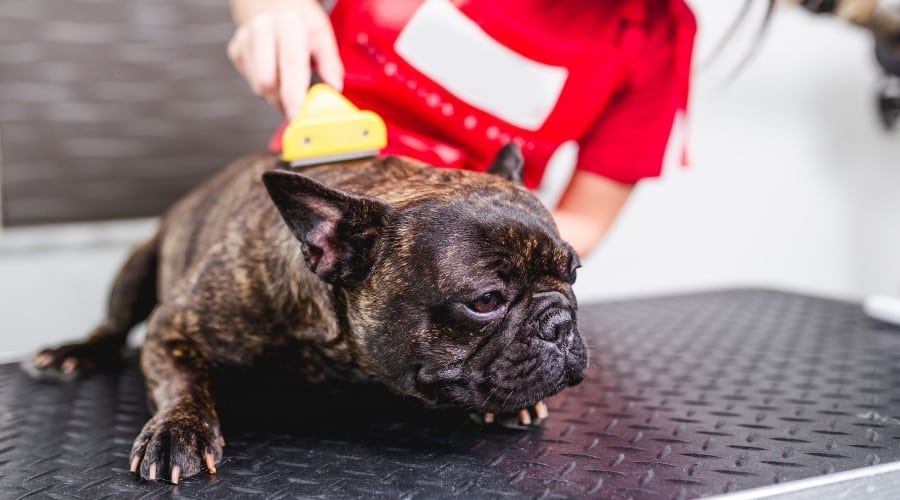An ER Vet’s Take: Reasons Not To Get A French Bulldog (Read This Before You Regret It!)
When you purchase through links on our site, we may earn a commission. Here’s how it works.

“Breeding French Bulldogs should be illegal.”
Table of Contents
I’ve seen this statement countless times on social media and in various news articles over the last few years. It’s an unpopular opinion among many Frenchie owners and certainly a controversial topic, especially given this breed’s current soaring popularity. After all, French Bulldogs hold the #1 spot as the most popular breed in the United States and #2 in the United Kingdom.
Still, countless veterinarians will tell you that Frenchies are, in a nutshell, genetic disasters. I’ve been researching and writing about French Bulldogs for over a decade and have to agree. These adorable, hilarious, and loyal little pups make fantastic family pets, but at what cost to the dogs themselves? I recently came across this post on LinkedIn that speaks volumes from an ER vet’s perspective.
<iframe src="https://www.linkedin.com/embed/feed/update/urn:li:share:7298093963968757762?collapsed=1" height="900" width="100%" frameborder="0" allowfullscreen="" title="Embedded post"></iframe>After reading this post, I felt compelled to contact the author, Gunila Pedersen, Cand.Med.Vet, MRCVS, to discuss the topic of French Bulldog health and learn more about her experiences with this breed. Dr. Pedersen is a small animal emergency veterinarian who works night shifts at Northlands Veterinary Hospital in Kettering, England, United Kingdom. I’ve included more of her brutally honest but poignant observations from our conversation in this article.
By day, Pedersen hosts The Overwhelmed Vet Podcast and is a certified life coach, helping fellow veterinarians overcome professional burnout. Pedersen, herself, burnt out after owning her own veterinary clinic in Spain for 10 years but managed to find her way back to practicing veterinary medicine through self-help and receiving coaching. “I wanted to be a vet since I was 4 years old and now enjoy it to its fullest,” she says.
Why Are French Bulldogs So Popular?

First, it’s helpful to understand why Frenchies have become one of the most popular dog breeds. Sure, there’s the significant trend factor. French Bulldog celebrity owners abound — Lady Gaga, Reese Witherspoon, Megan Thee Stallion, 2 Chainz, Dwayne ‘The Rock’ Johnson, Martha Stewart — the list goes on and on. In our celebrity-driven, online-influencer world, this makes sense. Many of these celebrities share their Frenchies in their social posts and music videos.
You also certainly can’t discount their many positive attributes. Who can resist those adorable flat faces and bat ears? French Bulldogs have a loving, playful, and friendly temperament and get along extremely well with children. They’re also low maintenance in terms of grooming and exercise needs. Plus, their small size makes them adaptable to those living in apartments and urban areas. But are these traits worth breeding a dog who has a high chance of suffering severe health problems?
Reasons Not To Get A French Bulldog

The reasons? Experts make it clear. It’s all about the quality of life for these precious pups. Despite their soaring popularity and undoubtedly loveable nature, many veterinarians are on board with the negatives of French Bulldogs, but not from a behavioral standpoint. These vets, like Dr. Pedersen, witness firsthand how these little guys suffer from many severe health problems on a frequent basis. What are the most troubling concerns?
Brachycephalic Airway Syndrome & Breathing Issues
As Dr. Pedersen shared in her LinkedIn post, breathing problems are horrific in many Frenchies. Brachycephalic airway syndrome (BOAS) is a direct result of breeding these dogs to have the cuteness factor of a smushed-in face. Because of their abnormally shaped skulls and faces, Frenchies and other brachycephalic breeds face a host of breathing and other associated problems. Unfortunately, 50% of French Bulldogs have “clinically significant signs” of BOAS, according to the Humane Society Veterinary Medical Association.
I asked Dr. Pedersen to share the worst breathing impairments she sees most often in Frenchies. “It’s difficult to say which is the worst I see most because it’s a combination of all of them that make the symptoms so severe,” she explains. “I would say the shortness of their face. It makes the soft palate (which maintains its original length) flap into their larynx, effectively causing them to feel like they’re being tortured by waterboarding 24/7.”
Dr. Pedersen explains that this impairment also forces them to inhale food. “The larynx is incapable of separating air and food, and this causes aspiration pneumonia. Because of this, they struggle to breathe even more, panting and gasping, which makes their throat swell up. That’s when they come to me, basically purple and panicking.” Another problem that stems from BOAS is that Frenchies can overheat easily and are prone to heat stroke.
Spinal Problems
Frenchies are one of several breeds known to suffer from chondrodystrophy (CDDY), a genetic condition that affects cartilage and bone growth, resulting in shortened limbs and a predisposition to premature degeneration of intervertebral discs. This disorder leads to chronic intervertebral disc disease (IVDD). In fact, one large study found that French Bulldogs were among the top five breeds with the highest rates of IVDD.
Dr. Pederson says spinal issues are the second most common thing she sees Frenchies for in the emergency room. “They are prone to collapsed intervertebral discs, which then press on the spinal cord, causing either acute, extreme pain or sudden paralysis of the hind legs,” she shares. “The dog I wrote about on LinkedIn, in addition to not being able to breathe, also walked very stiffly on very straight hindlegs, and when we X-rayed his lungs, we incidentally found deformed vertebrae and ribs.”
She adds that these cases can occur in very young Frenchies. Unless the symptoms aren’t very severe and dogs can recover with crate rest, they need a referral to a specialized center and have spinal surgery. “This means thousands of pounds [dollars], and for most owners, it’s only doable if they have high-range pet insurance that can and will cover the surgery. If you ever see Frenchies in the street, you may notice how many of them walk ‘funny,’ dragging a leg or limping.”
Breeding & Birthing Problems
Another common reason Dr. Pedersen sees French Bulldogs in her ER is for cesarean sections (C-sections). If you’re not a breeder, you likely wouldn’t know that most Frenchies have serious problems mating and birthing naturally.
Due to selective breeding practices, French Bulldogs frequently require artificial insemination because their narrow hips make natural mating difficult. These long-time breeding practices have also resulted in large heads and slim hips, which prevents dams [females] from giving birth naturally; instead, they must undergo C-sections for every litter, exposing the mothers to invasive surgery each time. Additionally, their compromised airways lead to a higher risk of complications during anesthesia compared to other dog breeds.
These are only a handful of health concerns. Frenchies also frequently suffer from brain tumors, dental disease and dental development problems, chronic allergies, ear infections, gastrointestinal (GI) issues, eye disorders, and more. All of these conditions are genetically inherited. Be sure to read our article about the most common French Bulldog health issues to learn more about this breed’s challenges.
<blockquote class="tiktok-embed" cite="https://www.tiktok.com/@amirthevet/video/7380398536380173573" data-video-id="7380398536380173573" style="max-width: 605px;min-width: 325px;" > <section> <a target="_blank" title="@amirthevet" href="https://www.tiktok.com/@amirthevet?refer=embed">@amirthevet</a> Replying to @user6672817269818 my Honest opinion on french bulldogs <a title="frenchbulldog" target="_blank" href="https://www.tiktok.com/tag/frenchbulldog?refer=embed">#frenchbulldog</a> <a title="frenchie" target="_blank" href="https://www.tiktok.com/tag/frenchie?refer=embed">#frenchie</a> <a title="learning" target="_blank" href="https://www.tiktok.com/tag/learning?refer=embed">#learning</a> <a title="dogs" target="_blank" href="https://www.tiktok.com/tag/dogs?refer=embed">#dogs</a> <a target="_blank" title="♬ original sound - Amir Anwary" href="https://www.tiktok.com/music/original-sound-7380398666165816070?refer=embed">♬ original sound - Amir Anwary</a> </section> </blockquote> <script async src="https://www.tiktok.com/embed.js"></script>Amir Anwary, aka Amir the Vet on TikTok, is a practicing veterinarian in South Africa
Other French Bulldog Negatives

While there are some other fairly minor negatives about owning a Frenchie (separation anxiety, stubbornness, flatulence), purebred French Bulldogs are the worst to own if you want to save yourself from expensive breeder rates and/or exorbitant vet bills. At least, that’s the consensus I’ve seen from countless veterinarians and many previous owners.
They’re Expensive
The average price of a high-quality Frenchie from a reputable breeder is around $5,300, starting around $3,000. (If you see French Bulldog puppies for sale for under $2,000, that could be a major red flag.) Frenchies with serious health problems could end up costing tens of thousands of dollars during your pup’s lifetime on top of general expenses.
Irresponsible Breeding Is Rampant
If you’re looking for an inexpensive Frenchie, it’s not worth the risk. Unfortunately, the popularity of French Bulldogs has attracted many inexperienced breeders, often called backyard breeders, who are primarily focused on making a quick profit by breeding their dogs and selling the puppies without proper knowledge of what they’re doing.
Additionally, some dishonest dealers source puppies from low-welfare puppy farms and misrepresent them as healthy animals. Another concerning issue is the illegal importation of puppies from other countries. These practices can pose serious risks and result in puppies that are not healthy. See my information below about ethical breeders.
Where Are Frenchies Banned?
The ethical concerns over French Bulldogs’ health welfare have led to legal bans (unfortunately, not in most of the world). But a few countries and cities are leading the way. Norway, in particular, has largely banned the breeding of Bulldogs (including Frenchies) and Cavalier King Charles Spaniels (another brachycephalic breed), calling their breeding a violation of the Norwegian Animal Welfare Act. In the U.K., similar restrictions have been proposed for years, but no progress has yet to be made.
In late 2024, Ojai, California, became the first U.S. city to prohibit the breeding of French Bulldogs and other breathing-impaired breeds (BIBs). Both the Canadian Veterinary Medical Association (CVMA) and the Australian Veterinary Association (AVA) have urged more careful breeding practices for brachycephalic dogs and emphasized the need to educate pet owners about the associated health risks.
If you ask my opinion, I would ban brachycephalic breeds. I cannot see the reason behind bringing suffering animals into the world when there are so many other, more normal-looking and non-suffering animals that need a home. Imagine if we did that to children with IVF. I think that trying to get Frenchies to a normal suffering-less state would take way too long; there are too many grey areas, and it’s impossible to control unethical breeders anyway.
– Dr. Gunila Pedersen
Can You Find An Ethically Bred French Bulldog?

Dr. Penderson sees a lot of Frenchie breeders bringing in their pups to the ER. “All the French Bulldog breeders I have personally met were walking red flags (lack of basic knowledge around breeding, hell-bent on saving money, calling around to find the cheapest place to get a C-section, mum dogs often underweight and shouldn’t have been pregnant in the first place…” she says candidly.
As with all purebred dogs, it’s crucial to find a reputable breeder. However, many experts still consider the gene pool for purebred Frenchies as a hot mess, even with responsible breeding. So there’s a limit to being able to find a truly ethical French Bulldog, depending on what you consider ethical.
You can find a reputable breeder on the French Bulldog Club of America’s preferred breeder list on their website. These breeders must adhere to the FBDCA Code of Ethics and do health testing on their dogs. An AKC Breeder of Merit also meets these requirements.
Breed-Specific Health Screenings For Frenchies
Below are the Canine Health Information Center’s (CHIC) registry required and recommended exams that responsible breeders will conduct on the Frenchies they are mating. Be sure to request these results from any breeder you’re considering.
- Hip Dysplasia: (OFA Evaluation, OVC Evaluation, or PennHIP Evaluation)
- Eye Examination: (by a boarded ACVO Ophthalmologist- Annual recertification recommended)
- Patellar Luxation: OFA Evaluation
- Cardiac Evaluation: Congenital Cardiac Exam (Echocardiagrams recommended but not required) or Advanced Cardiac Exam (Echocardiograms recommended but not required)
- Autoimmune Thyroiditis: (optional) OFA evaluation (from an approved laboratory)
- Juvenile Cataracts: (optional) Juvenile Cataracts DNA Test (from an approved laboratory)
What’s missing? There are no required or recommended screenings for BOAS or CDDY with IVDD (also called chondrodystrophy). Still, many reputable breeders conduct DNA tests for chondrodystrophy (although the current testing isn’t definitive). For BOAS, a relatively new screening is now available in the U.S. through the Orthopedic Foundation for Animals (OFA). The Respiratory Function Grading Scheme (RFGS) is designed to advise owners if their dog is affected by BOAS and give guidance to breeders on how to lower the risk of producing affected puppies.
OFA testing results show that of the French Bulldogs who underwent health screenings, nearly 61% tested positive for chondrodystrophy, and 33.5% of Frenchies had significant signs of BOAS. Other notable disorders include hip dysplasia (over 33%) and dental problems (over 17%).
What’s The Reality Of Owning A French Bulldog? (Video)
Here’s one case of an owner who got her Frenchie from an AKC Breeder of Merit, a title given to breeders the club believes have gone “above and beyond on health issues, temperament, and genetic screening.” PETA (People for the Ethical Treatment of Animals) features this heart-breaking video of Heather Hanna, one owner who’s struggled to care for her Frenchie Arnie.
Hanna’s story was also featured in an article by National Geographic. As she told National Geographic, “I would recommend choosing another non-flat-faced breed or, even better, adopt a mutt from the shelter—one with a proper nose and a bit of a tail. I will never, ever, ever intentionally acquire another Frenchie.”
Already Own A French Bulldog?
I’m sure you’re head over heels for your little Frenchie and don’t want them to suffer from severe health issues, but the reality is that this breed often does. Given the inordinate number of health problems Frenchies face during their lifetime, it’s wise to consider getting pet insurance.
Pet insurance makes emergency treatment for breathing issues, surgery for spinal problems, and everything in between much more affordable. By covering a large portion of your vet bills for unexpected, non-pre-existing conditions, an insurance policy gives you the immense benefit of never having to decide between your wallet and your pup’s health care. See my colleague’s expert article on the best pet insurance providers to learn more.
Why Trust Canine Journal?
Sally has over 20 years of experience in human health sciences communications, including more than 10 years as an expert on pet health conditions and treatment. She’s part of a team of dedicated canine professionals and long-time dog owners at Canine Journal. We test and research the best pet products, not only for our own pups but for all of our readers.





